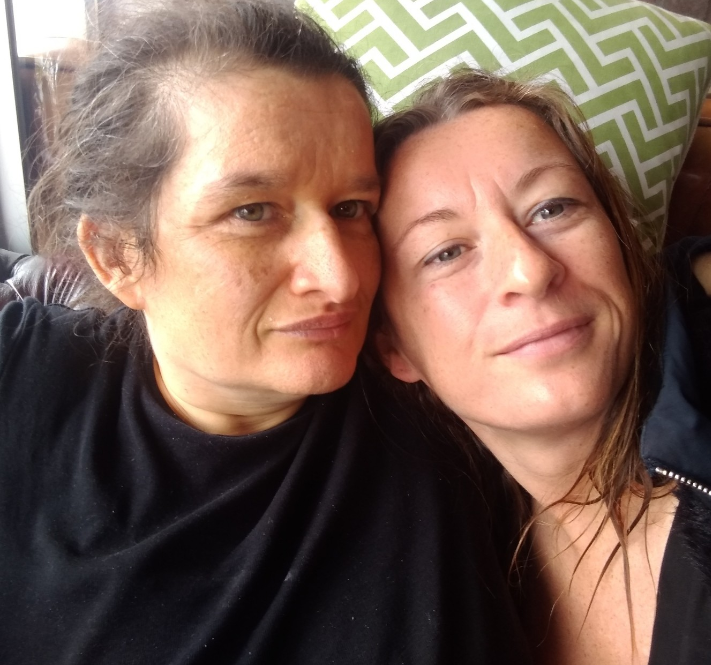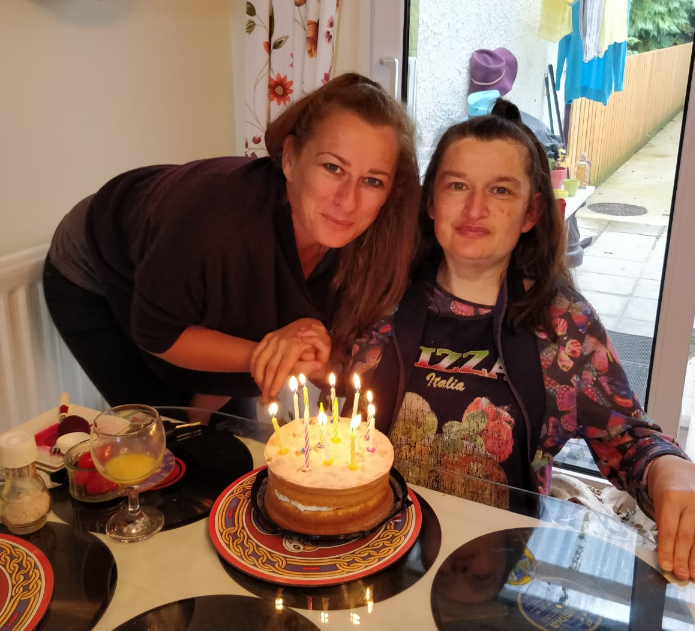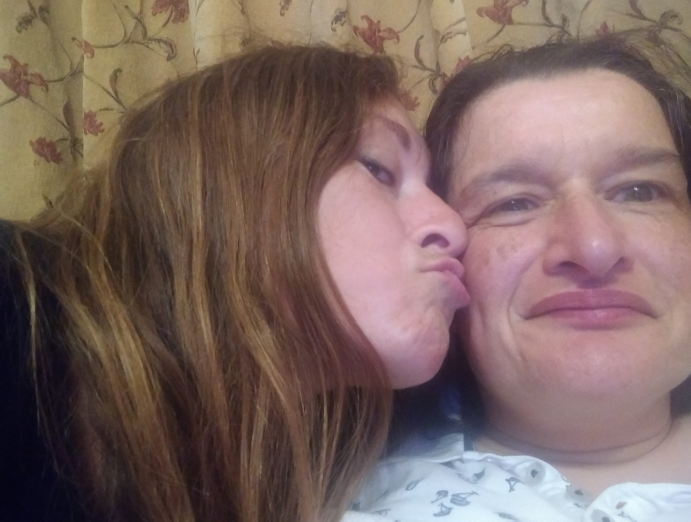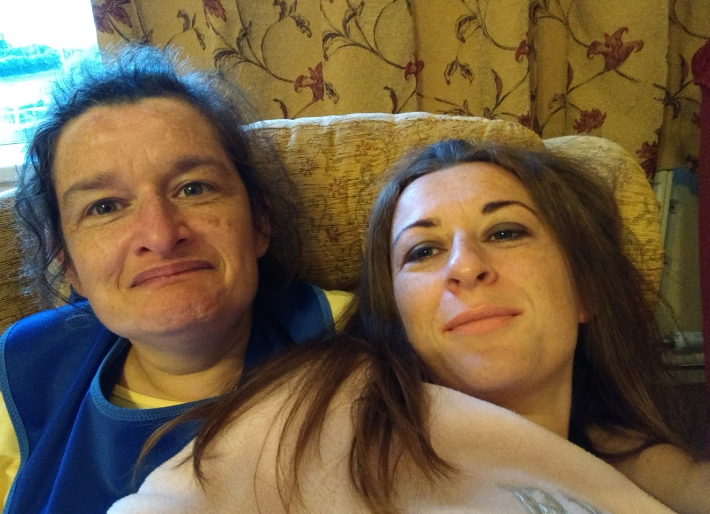
Above: Joan and her sister, Irene
Sibling Joan Corrigan shares her experiences in this powerful two-part blog ‘Accountability’.
We know that many siblings will relate to Joan, when she says:
“The powerlessness I feel is the worst, but not for me, for my sister. I feel this strong compulsion to protect her, given my skills and her total lack of ability to defend herself.”
Both were originally written by Joan for Participation and the Practice of Rights (PPR), a human rights organisation based in Belfast, Northern Ireland. If you are impacted by these blogs and want to take action, you can visit the PPR website.
Joan would love to hear from other siblings anywhere in the UK, who are interested in campaigning – even in a light way. You can contact Joan directly via X (Twitter), @Joancorrigan1
You can also join an adult sibling support group. Groups don’t focus on campaigns, they’re about sharing support and information amongst siblings. It’s a friendly and welcoming place to meet others and share experiences. Find out more and sign up here.
Read Joan’s blogs below:
Accountability – a rigged game you will always lose (part one)
 My sister Irene is a loving, gentle, sweet woman, who likes to steal biscuits from the plate when you are not looking. She keeps an album of me and her close to her at all times, and her little head arches forward on her centre’s bus, when she sees, from a distance, that I am at the top of the lane, waiting to welcome her.
My sister Irene is a loving, gentle, sweet woman, who likes to steal biscuits from the plate when you are not looking. She keeps an album of me and her close to her at all times, and her little head arches forward on her centre’s bus, when she sees, from a distance, that I am at the top of the lane, waiting to welcome her.
She loves adventures, her day centre (and their wonderful staff) in Enniskillen, music, her family. She’s alert and clever. However, she needs help with eating, walking, dressing. She knows she is loved immeasurably by us. She can say very few words. But she can say ‘I love you’.
It is very important for me to be clear at the outset here – I am totally indebted to the care that my sister receives from all manner of Trust staff. The care is exceptional, life changing and life enhancing.
I reject the idea that you can’t be simultaneously grateful for the stellar work carried out by the majority of Trust staff and be horrified and rejecting of the decisions and conduct of other, much more senior staff. These positions are in no way mutually exclusive.
Sadly, my experience of trying to secure accountability in relation to the decisions and behaviour of those in senior positions has been a constant battle. Yet I know it is little more than a game to them. When I started doing this, I had no idea how ugly and completely rigged that game would be.
The biggest shock I got was when, in response to my requests for information, and my refusal to give up on those requests, a number of public health bodies all labelled me ‘vexatious’. And based on that lie, refused to engage with me.
Authority doesn’t intimidate me, nor do I make any judgement on those who cannot or do not criticise it, but I was pretty upset. Upset about the false claims made about me as a ‘vexatious complainant’.
That term ‘vexatious’ is taken from official guidance on complaints. It suggests a person who makes baseless complaints for the sake of it and harasses staff with nonsense. None of what I ask is nonsense. Yet what I get back is nonsense.
Labelling me ‘vexatious’ is a way to undermine and silence me – it frames any questions or complaints I raise as inherently wrong, baseless and flawed from the get go. It characterises me as troublemaker, time-waster, not to be taken seriously – to be ‘handled’ and ‘processed’ to minimise and protect those in power from any possible comeback.
It constructs the process in a way which dehumanises not only myself as complainant, but more importantly my sister on whose behalf I have been advocating.
This is inequality of arms in practice. Attempting to discover what went wrong through an internal complaints process – being investigated and adjudicated upon by the self-same organisations which you are alleging carried out the wrong-doing. And then the complainant being categorised by them as ‘vexatious’ for daring to come forward with challenging questions and not shirking away at their token disingenuity.
These organisations have significant resources at their disposal to handle complaints. They are likely well versed in a whole array of strategies to see off individuals who do not have those same resources.
It is extremely hard to be just one woman, one person fighting multiple corporate teams at the same time. And whilst they never call themselves to account, based on my experiences, their spiel about ‘lessons being learnt’ is pie in the sky. It is extremely abusive on their part and has serious ramifications for any loved one’s mental health.
Some, usually senior Trust staff, feel free to be arrogant, curt and extremely unhelpful to complainants, but we must always be deferential and with joined hands in front of them? Such undeniable double standards.
The truth is, any way you approach it you’re likely to lose. You might understandably be hurt and likely angry, which are valid emotions, yet they won’t engage with you.
You might be silent and they will do what they want.
You might be polite and courteous and they will bamboozle and hoodwink you and fill you with disingenuous nonsense.
You can be assertive as I have been, when you know your rights as I do, and they come up with terms like ‘passive aggressive’ which is completely arbitrary and they have free rein to define you as they please, on their whims. When asked for proof of claims, they stay silent. And that’s their privilege.
They use your level of dissatisfaction and the amount of times you (rightly) challenge them, against you, so that it is not their behavior that is the ‘crime’, but your pointing it out. It’s not their abuse that is the issue. It’s your reaction.
Often, they simply act as if you haven’t asked the questions, which you have put huge effort into writing and which describe huge struggles you have been experiencing, mostly because of something they have done or not done.
I have been at the receiving end of some of the worst contempt, within an environment which is supposed to be about care and support. Within a system which prides itself on its commitment to Personal and Public Involvement (PPI), the legal requirement on certain HSC organisations to involve and consult patients, families, carers and local communities on the planning, delivery and evaluation of services.
Cutting remarks such as ‘thanks for bringing this to my attention’ whilst cutting off the oxygen of your complaint is particularly nauseating. Believe me when I say it really is an ‘un-fun’ way to spend your time!
Thankfully I have been living in a hot climate and by the sea for years and that brightness and lightness takes me away from the very dark matter that is all of this. It keeps me from losing my mind.
To know what your rights are, and to be clear on that, is not ‘cheeky’. It is not being ‘difficult’. You are not ‘bad’ or ‘greedy’ for expecting not to be lied to.
As adults we all know that life is not fair. But there is something so inherently wrong with exploiting the weakest, the most defenseless, that it is impossible for me to let it be.
At the heart of what I do is love. For my exceptionally amazing, learning-disabled sister, and for all the individuals with learning disability, those bright, smiling superstars out there who I have worked with and who have enriched my life immeasurably. They deserve better.
* In 2016, the Western Health and Social Care Trust admitted that learning disability services across the Trust have been underfunded by £42 million over the previous six years. That admission came after the Health and Social care Board completed a review into underspend and found that in the 2013-2014 financial year, there was an underspend of £8 million in the Western Trust, with funds for learning disability being ‘misallocated’. Read more:
‘Public meeting to query disability service’s missing millions’, 24 May 2016
‘Action Group vows to lead fight to get back disability services’ lost millions from Western Trust’, 30 May 2016
You can find the original blog entry here
Accountability – you can care but you must toe the line (part two)
 I drive. We hold hands. We sing. We connect. I blow raspberries on the back of her hand. She laughs. We feel free. That’s us on the back-roads of Fermanagh when I am home.
I drive. We hold hands. We sing. We connect. I blow raspberries on the back of her hand. She laughs. We feel free. That’s us on the back-roads of Fermanagh when I am home.
You might see us, smiling, singing Dolly Parton songs. Arney, Boho, Derrygonnelly, Garrison, Belcoo. The Ancient forests. The lakes. The thatched cottages. The stone bridges and waterfalls. Spellbinding scenes of silent beauty.
And two sisters. Getting lost on these roads. Unified on a cellular level. These journeys are some of the most cherished moments I have in my life. My other journeys, for accountability have been the complete antithesis of beautiful.
They have been so damaging to my health. Worry lines, newly grey hairs, muscles clenched and a tangible powerlessness in my bones.
The powerlessness I feel is the worst, but not for me, for my sister. I feel this strong compulsion to protect her, given my skills and her total lack of ability to defend herself. That juxtaposition haunts me.
What can I do? What can I do? Like I can never do enough to equal things out for the two of us. To give her an equal playing field. And yet I simply cannot help her with this injustice.
Knowing that the funding for vital services and support which she was entitled to, but which was taken from her historically, won’t be paid back to her in the future, is a hard pill to swallow. The unused respite over the Covid period which our family could not use, but cannot be carried into the next year. That money too.
Whatever the sum is. The sum is not the full issue. It’s the financial abuse. The gesture. The exploiting of her weakness. The nonchalance, the indifference. The contempt flung at me, her ‘defender.
What I have learned from this system is that you can care but you must toe the line. You can care but you must “control yourself” to fit in with the rhythm these health bodies work at and their mechanisms. And in the process of “controlling yourself”, you lose.
You can care but you must know your limits, or rather, their limits. You must respect the very limits, which, if crossed, would ensure things were fair, accountable and functional.
So, I ask myself, why are we collectively stopping short of these limits? Who benefits from these limits being in place? And how can we move beyond these limits which invariably protect the institutions?
In 2021 the Department for Health consulted on policy proposals to enact a statutory Duty of Candour in NI*, one of the key recommendations arising out of the Hyponatremia-Related Deaths Inquiry.
Such a duty would create a legal responsibility for all healthcare staff and organisations to be honest when things go wrong. This duty would not just apply to being open and honest with patients but also within organisations in their reporting adverse incidents or near misses that may have led to harm.
Based on past experience it is hard to be optimistic, however, the proposed legislation does outline where things should be heading. This is an unpleasant journey, full of pot holes and dead ends. But we travel in hope.
* Read more about the proposed statutory Duty of Candour:
‘Public Consultation on the introduction of a statutory Duty of Candour in Northern Ireland’, August 2021
‘Call for Stormont to reject BMA and GMC stance on NI duty of candour’, September 2021
You can find the original blog entry here

Related pages: